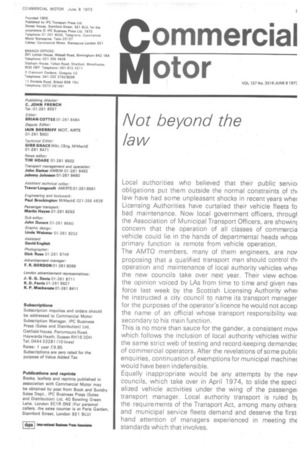Not beyond the law
Page 29

If you've noticed an error in this article please click here to report it so we can fix it.
Local authorities who believed that their public servic( obligations put them outside the normal constraints of thi law have had some unpleasant shocks in recent years whet Licensing Authorities have curtailed their vehicle fleets fo bad maintenance. Now local government officers, througl the Association of Municipal Transport Officers, are showinc concern that the operation of all classes of commercia vehicle could lie in the hands of departmental heads whos( primary function is remote from vehicle operation.
The AMTO members, many of them engineers, are nov proposing that a qualified transport man should control th operation and maintenance of local authority vehicles wher the new councils take over next year. Their view echoe: the opinion voiced by [As from time to time and given nev force last week by the Scottish Licensing Authority whei he instructed a city council to name its transport manager for the purposes of the operator's licence he would not accep the name of an official whose transport responsibility wa: secondary to his main function.
This is no more than sauce for the gander, a consistent mov( which follows the inclusion of local authority vehicles withir the same strict web of testing and record-keeping de mandec of commercial operators. After the revelations of some public enquiries, continuation of exemptions for municipal machine would have been indefensible.
Equally inappropriate would be any attempts by the nev councils, which take over in April 1974, to slide the speci alized vehicle activities under the wing of the passengei transport manager. Local authority transport is ruled the requirements of the Transport Act, among many others and municipal service fleets demand and deserve the first. hand attention of managers experienced in meeting thE standards which that involves.












































































































































